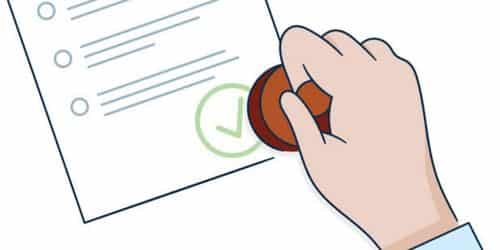Most businesses require some form of business license to function legally in the state in which they are. Note that each state’s license requirements vary depending on the type of business you’re running and where it is located. State business licenses are required in several states, regardless of the type of business you are doing. Some require a state license that only relates to a specific kind of business, while others require none at all. And possibly, you might require more than three licenses to operate your business legally. If you skip a step, it might lead to a lot of issues down the road. Therefore, this guide will walk you through the steps necessary to obtain a business license. We’ll also discuss whether it’s really necessary to acquire a business license to run a sole proprietorship business or sell online, through Shopify.
What Is a Business License?
A business license is a document issued by a government body granting you authorization to run a business in an area under the agency’s jurisdiction. Getting a business permit from a country’s government agency, for example, enables you to run a business inside the country’s boundaries.
It’s important to know the rules for obtaining a license in each state and even in each town. Unless you’re operating in an area where licenses aren’t required, it’s likely that your business will require at least one license in order to function legally.
You may also require permits in addition to company licenses. If a business concerns public health, such as a restaurant or a skincare or massage parlor, it may need a permit in order to operate legally. It all depends on the type of company you’re starting as well as the place where it’s operating. Obtaining a license or permission might sometimes be as simple as filling out an application; in other circumstances, you will be required to take and pass an examination.
The Reason for a Business License
Ultimately, these permits keep people safe. Protecting the public from fraud is a direct result of the enforcement of regulations, which deter unethical or incompetent individuals from establishing businesses.
Business owners obtain this permit to assure that their operations are legal, their employees are treated professionally, and the parties concerned are genuine.
How a Business License Works
Before you start a business, you’ll need to apply for an employer identification number (EIN), which is simply a business’s Social Security number. Permits will be granted to you according to your business niche. Hence, you should also apply for it by specifying the nature of your business so you don’t apply wrongly.
Types of Business License
Some firms can operate with only the most minimal of permits. A general business license, for example, may be enough for a one-person, in-home craft enterprise (or no license at all in some cases).
It is important to remember that you will need licenses and permits when you establish a business, hire staff, import items from other states and countries, sell alcohol and weapons, or provide a service that requires particular training. A lawyer can help you figure out which ones you’ll need before you start your business, as it might be difficult to tell which ones are necessary in your particular case.
The following are types of business licenses:
- The federal government
- State government
- Local governments
All these arms of government impose licensing and permission requirements on businesses. Once the necessary paperwork is complete, many of your items can be easily taken off the shelf. Others may require testing or inspections Others could also need to have tests or inspections done at their company.
#1. Federal Licenses
A federal business license may seem overly burdensome if you have already obtained local and state-level licenses for your business or company. There are several industries where federal licenses are necessary, but not for all small businesses. When beginning a business, you must know what federal licenses you need and secure them, or face fines or punishments.
Firearms, commercial fishing, aircraft, and the like are examples of industries that are subject to government regulations. You’ll need to check out a list of business licenses in order to operate legally.
Businesses Where License Is Compulsory
The following is a short list of businesses where obtaining a business license is compulsory.
- Agriculture: To be able to operate lawfully, you must first seek USDA permission.
- Alcohol: For a complete list of things you’ll require, go to the Alcohol and Tobacco Tax and Trade Bureau.
- Aviation: You’ll need to be licensed by the Federal Aviation Administration (FAA) to operate a firm in the aviation sector.
- Firearms, ammunition, and explosives: The Bureau of Alcohol, Tobacco, Firearms, and Explosives (ATF) can provide you with the information you need to get the necessary licenses.
- Fish and wildlife: All businesses dealing with animals should contact the U.S. Fish and Wildlife Service to determine whether they need a permit.
- Radio and television: If your firm broadcasts on U.S. radio, TV, satellite, or cable, contact the Federal Communications Commission (FCC) to secure a federal business license.
- Transportation and logistics: Though they are issued by the federal government, most of these are actually issued by your state government. Your state’s specific requirements for driving licenses may be found here.
- Mining, drilling, and nuclear energy: The Nuclear Regulatory Commission (NRC) in the United States requires a business license from everyone working in the nuclear energy industry.
- Maritime transportation: Do you ship freight abroad for your company? An application for a business license must be submitted to the Federal Marine Commission (FMC).
#2. State Licensing
A business license is necessary for every state, but each one has its own set of restrictions. SBA estimates that states require more businesses than the federal government, although some states are more market-oriented than others. However, state-by-state licensing requirements for starting a business differ, and not all states require a particular state license. Hence, you need to visit your state’s official government website to learn about the specific regulations in your area.
The following is a comprehensive list of the many state licenses you will need to establish a business.
- State business operating license
- Seller’s licenses
- Tax registration and permits
- Occupational licenses
#3. Local Licenses
To start your business, you’ll need to get the following permissions and licenses from your local city government. Even if you don’t end up using all of these licenses, they’re still worth going through because, of course, you never know. Hence, you should double-check the availability of each of these licenses and permissions with the right government agency before starting your business.
- Local business operating license
- Zoning and land use permits
- Building permits
- Fire department permit (Usually issued by your local, county, or city government)
- Health licenses and permits
- Signage licenses and permits
- Environmental licenses and permits
Do I Need a Business License?
Yes, most definitely.
As a general rule, most local governments require that each firm operating within their jurisdiction apply for a business license and pay a certain fee. There are some locations that term this permission “tax registration certificate” rather than “business license” because it is an essential minimum tax payment tax for all businesses in a specific region. Regardless of how small your business may be or whether you are running a sole proprietorship business, you will still need to register for a permit and pay this tax. Only a few businesses, such as freelance writers and graphic designers, and those who sell online, can get away without a business license.
Do I Need a Business License for My Sole Proprietorship Business?
According to popular belief, over 70% of businesses in the US are run by sole proprietors or sole traders. Sole proprietorship is a popular choice among many entrepreneurs because of the control they have over making business decisions and earnings and the ease with which they set up.
Also, start-up costs are low for sole proprietorships, which is why it is every man’s kind of business. You don’t have to register your business with the state like you would with a corporation or an LLC. However, legal permission and a license must be obtained before you can start a sole proprietorship business. But if your firm incurs any challenges or debts, you are going to be responsible for the payment.
Do I Need a Business License to Sell on Shopify?
No, you don’t.
For you to sell through an online platform like Shopify, you do not need a business license. However, having one is necessary in some circumstances.
A business permit may also be necessary depending on the locality or type of firm. Remember that business licenses are issued on a municipal, county, state, or federal level. If your city needs a business license to sell on Shopify, you will definitely need one even if Shopify doesn’t.
In the section that follows, we will address these possibilities. Specifically, we will talk about the criteria for a business license in order to sell on Shopify when necessary.
When Is a Business License Necessary to Sell on Shopify?
Having a business license is essential only when you employ the Shopify payment system or if you make more than $20,000 a month using Shopify.
In addition to these two Shopify criteria, it’s a good idea to verify the regulations for your location and country. Due to your city’s rules, even though Shopify may not require you to have a license, you may still need one.
Do I Need a Business License to Sell Online?
To put it succinctly, the answer is that it depends on the situation. Hardly can I say yes or no because, literally, sellers on online marketplaces like Etsy, Amazon, Shopify, and others don’t require you to have a business license to sell. Furthermore, certain states do not require licenses for side-hustle sellers who only sell to supplement their income. But if you want to convert your passion into a business and if your products are subject to government regulations, such as alcohol, cigarettes, or weapons, you’ll undoubtedly need a business license.
Some states don’t require you to obtain a business license immediately, even if you want to operate your company as an online marketplace vendor from the beginning.
The benefit of not obtaining a license is that you can focus on growing your firm, know whether it can make a profit, and know whether you’re on the right course. However, you should double-check with your state and local tax authorities. Some states and local governments demand a license for even the most insignificant business, while others are more lenient. So it all depends on your state and local tax authorities.
Requirements for a Business License
Before submitting your application, make sure you have all the necessary paperwork together. If you don’t prepare yourself, you’ll find yourself rushing back and forth to get your paperwork in order, even if it doesn’t ordinarily take that long. Here are the requirements you will need for a business license below.
#1. Employer Identification Number (EIN)
There is an Employer Identification Number (EIN) requirement in several states. It’s like a social security number for your business, and you can acquire one for free online. Having an EIN number means that your business can be formally recognized by the Internal Revenue Service (IRS).
An EIN is necessary to open a business bank account, and if you’ve previously done so, then you already have an EIN.
#2. Tas Status Proof
A tax permit or tax return may be a requirement as proof of your tax status. This document type is less frequently in use than the others on the list.
#3. Operating Capital Proof
If you’re seeking a job in the construction or architectural sectors, you may need to provide proof of your operating capital. This is a measure of your available cash and/or business credit. This is particularly the case for sectors that need a large initial investment.
Also, your state may ask you related business questions. It might include the type of business you’ll be running, how much money you plan to generate, your location, and contact details.
This is just the department’s approach to measuring your business readiness and planning.
Steps to Getting a Business License?
- Register your business.
- Find out which license your business requires.
- Apply for it.
- At some point, you will have to wait a while to get a response from your agency.
- If you don’t get approval, you might want to reapply or find out why. Also, you can reapply if your license has expired.
Bottom line
Running a business without a license is like a car on acceleration without a brake pad. It’s a very risky try. You could run into problems and have nothing or no one to return to.
That aside, after you get the right licenses for your business, ensure that you keep note of any renewal dates for your licenses as soon as you have your business up and running so that you don’t face fines or penalties if you don’t keep up with the requirements of your licenses.
Do I Need a Business License? FAQS
What if my business is an online business?
Hardly can I say yes or no because, literally, sellers on online marketplaces like Etsy, Amazon, Shopify, and others don’t need to have a business license to sell. But if your products ranges around alcohol, cigarettes, or weapons, you’ll undoubtedly need a business license.
What are the steps I need to go through to obtain a license?
- Register your business.
- Find out which business license your business requires.
- Apply for it.
- Wait a while for a response from your agency.
- Reapply or find out why if you weren’t given approval, or your license has expired.
Must i obtain a business license before i can start a sole proprietorship business?
Legal permission and a license must be obtained before you can start a sole proprietorship business






